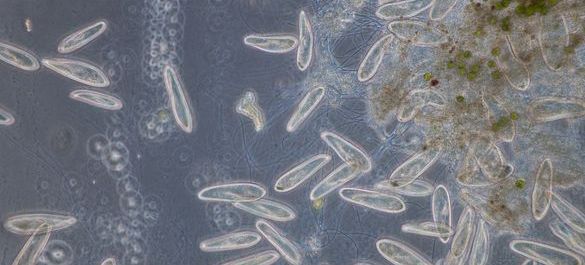What are Protozoa?
Protozoa are micro-organisms which have a membrane bound nucleus that can't be categorised as a fungi, animal or plant. Most protozoa are free living, but some are parasitic. They are heterotrophs, meaning that they eat other plants or animals for energy and nutrients. They come in many different shapes and sizes ranging from an Amoeba which can change its shape to Paramecium with its fixed shape and complex structure.
They can be found in a variety of environments including fresh water, marine environments, the soil and the human body. Some protozoa are pathogens that can transfer between humans via the faecal oral route (Cryptosporidia) or an arthropod vector (malaria).
Image: Paramecium is a genus of unicellular ciliated protozoa iStock/tonaquatic

